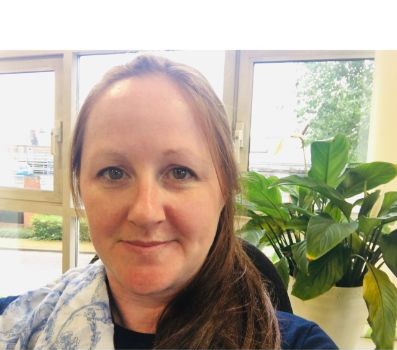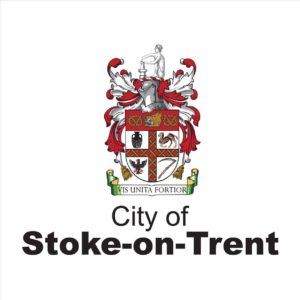Meet Sarah Totten. She works for Stoke-on-Trent City Council under the Director of Adult Social Care, Health Integration and Wellbeing. Sarah and her team are very much on the front line; she’s the link between hospitals and care homes – and has responsibilities for safeguarding adults too.
As well as having a massively busy day job it’s been quite a year for Sarah. She gave up a kidney to help her dad survive following kidney failure; she knows she’s now more vulnerable to Covid-19.
She’s also been supporting her daughter through a difficult birth and post-natal depression; lockdown wasn’t the ideal time to welcome her first grandchild Robyn. And when Sarah returned to work things had changed massively and lockdown was here. She says, “The world had turned upside down and inside out. I had to adapt and get up and running quickly.”
Everyone has been really adaptable and positive
Sarah, like many of our heroes, is keen to stress that what she been doing during the pandemic is part of a whole team effort, and that’s not just her immediate team but other teams across the council and outside partners that she’s working with. She’s been amazed at how adaptable everyone has been and praises their positive attitude – there is a really strong sense of “these are our residents and it’s our job to help them.” Sarah and her 32 strong hospital team, including many social workers, have the task of supporting patients and getting them out of acute hospital beds, and community health services, when the clinical staff say they are medically fit to leave.
Sarah and the wider team work in hospitals talking directly with the patients and the clinicians to determine the best option when they are deemed ready to leave hospital, whether that’s going back to their own home, a nursing or care home or a community hospital. It depends on their individual care needs and circumstances so it is up to Sarah and het team to get to know the patients and involve them in these decisions.
Working as a team to speed up the transfer from hospital
Assessing patient’s needs takes time – yet the instruction was to speed this process up to enable the NHS to be able to cope with Covid-19 cases. The Government priority to ‘Protect the NHS’ meant freeing up beds where it was safe to do so and making the transfer from hospital far faster. And that’s exactly what Sarah and the team have done. Very successfully. The figures point to a twelvefold increase in the speed of discharge.
Sarah and the team then focused attention on what was fast becoming the next big issue – the rising Covid-19 infections in care homes. There are over 100 homes across Stoke – including residential, nursing and extra care. Some are run by the Council but most are independent. “We recognised that our care homes and their clients needed some support – they are our vulnerable residents,” says Sarah.
A new partnership – The Care Home Support Team – was created bringing the right people together from social care, environmental health, public health and infection control to offer homes advice and support. A checklist was used in homes either face-to-face or over the phone, to talk through issues ranging from PPE supplies, deep cleaning, infection control support, communications and end of life planning including family visits. The team also offered admission avoidance services through our acute hospitals CRIS, the Community Rapid Intervention Service.
Helping care homes navigate through the pandemic
Care home managers really welcomed the non-inspection type of support. Following one daily check-in at a home the manager emailed after to say, “The nicest thing about the visit was when I was asked and how are you doing? Not the team but how am I as a person. Is there anything they can do to help me?” She then added, “The whole process felt like we had extra team members whose purpose was to support us in navigating our way through the Covid-19 pandemic.”
The support was very practical too. In one instant a new washing machine was purchased, so that washing could be done on site to reduce the risk of infections – they were taking clients clothes to be washed at another home. Another example is teaming up a new care home manager, where she had to step up after the death of the existing manager, with a mentor to help support her emotionally as well as in her new role which comes with additional management responsibilities.
As Sarah says, “We really wanted to support the care homes. No ask they made was off the table and we were able to pull in help and support very quickly. We know this has helped prevent vulnerable residents from going into hospital and lowered infection and mortality rates within our independent care providers.”
Sarah is determined to continue to develop this service with a ‘step up’ so that our homes are better able to cope with winter flu and other outbreaks and also to support our quality and monitoring of homes that may be struggling.
It’s always worth making time to get out on the wards
Sarah has always wanted to be a social worker. She was what she calls a “nightmare teenager” and ended up in living in hostels from the age of 17. During that challenging time she really valued the professional support she received. It made her want to help others so she pursued her social work degree, all the more impressive because she had become a young mum too.
What advice would she pass on to others? She says, “Never stop learning from those around you; nothing works when you operate in a silo so always work with others; get out and enjoy meeting people and listening to their stories. When I do get out on the wards and meet people I love it. It is always worth making time for.”
If you are interested in exploring public sector jobs within West Midlands please visit www.wmjobs.co.uk



